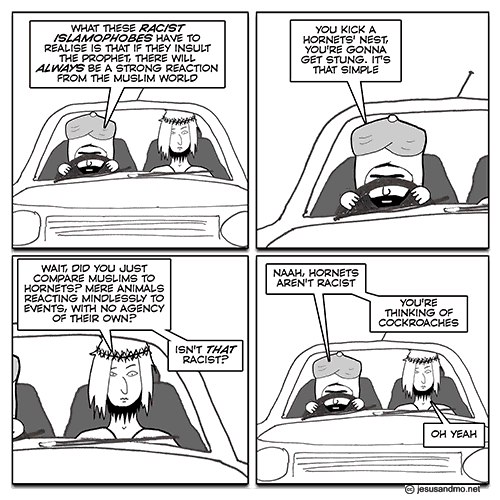Paul Berman starts his long and brilliant article on the Charlie Hebdo-PEN protests by noting that both sides agreed on the values; it was the facts that were contested.
The protesters, most of them, wanted the world to know that, in regard to press freedoms, their commitments were absolute. Willingly they would defend the right even of Nazis to say whatever terrible things Nazis might say, as the ACLU once did in Illinois. But they honestly believed that Charlie Hebdo is a reactionary magazine, racist against blacks and bigoted against Muslims, obsessively anti-Islamic, intent on bullying the immigrant masses in France. A dreadful magazine. Nazi-like, even—therefore, a magazine not even remotely worthy of an award from PEN. On these points the protesters were adamant. Only, why?
A modest heap of useful information about racism in France and the distinctly non-Nazi political nature of Charlie Hebdo and its cartoons did accumulate during the course of the affair, and the modest heap ought normally to have changed a few minds. Nobody’s mind seemed to change, however.
I noticed that. I didn’t understand it and still don’t. Was it just wounded ego in all cases? They just couldn’t admit they’d gotten their facts wrong? They could make a big public fuss but couldn’t bring themselves to undo the damage even when told how wrong they were on the facts?
I attended the PEN Gala and listened to the speeches and found myself wishing that my friends among the protesters, having boasted to the entire universe of their boycott, had sneaked in, anyway. They would have watched the leaders of PEN bestow the award on Charlie Hebdo’s surviving staffers, and this would have of course been galling, given what they believed about the magazine. They would have heard Charlie Hebdo’s editor utter his incisive mot, “Being shocked is part of democratic debate. Being shot is not,” which was impressive and true and maybe immortal, yet would have left them unmoved because it did not speak to their objection. But what would they have made of the speech by Dominique Sopo, who is the president of an organization called SOS Racisme? SOS Racisme is the liveliest and most prominent civil-rights organization in France, and its president’s speech was the liveliest moment of the controversy.
But apparently they remain unmoved even by Dominique Sopo and Alain Mabanckou. They still think they know better.
SOS Racisme’s slogan was “Touches pas à mon pote,” or, “Don’t touch my buddy,” which charmingly expressed and still expresses the anti-racist ideal. With this slogan the organization enjoyed a major success. “Touches pas à mon pote” has entered the French language. SOS Racisme succeeded for a while in getting young Arabs and North African Jews in some of the immigrant districts to work together in neighborhood committees, and these activities inspired admiration in still other neighborhoods. The people who attended the PEN Gala heard a few echoes of those achievements in Sopo’s speech, in the easy way he condemned several different kinds of bigotry at once—bigotry against Arabs, Muslims, blacks, Jews, and Roma, quite as if a prejudice against one were a prejudice against all. You think it is easy to express an across-the-board liberalism of that sort in our day and age? And sound other than wimpy? I have always admired the oratory of the French left.
I do think it’s easy, actually…but then I’m a universalist, so maybe I would.
SOS Racisme nonetheless counts for something in France. It is the single loudest voice of anti-racism. It is a glory of the democratic left. And it was a dramatic thing to see SOS Racisme’s president speak up for Charlie Hebdo at the PEN Gala—for the Charlie staffers who, as he took pains to explain, have always been his comrades, allies in one campaign after another, always, always. Anybody who gives a little thought to Sopo’s analysis ought to be able to understand something about Charlie Hebdo’s world-view, too, which amounts to something more than equal-opportunity mockery. To satirize the National Front, as Charlie Hebdo has done relentlessly—this has been more than a good idea, politically speaking. To satirize the Islamists—likewise. Charlie Hebdo’s cartoons have more than once drawn a distinction between the political Islamists, with their frightful ideas, and a French Islam that is perfectly consistent with the most progressive of principles and the well-being of the immigrant neighborhoods
But the protesters thought they knew better – despite being told that they didn’t.
Yes, what would the protesting writers at PEN have made of any of this, if only their own boycott had not prevented them from hearing Sopo make his argument? Or if they had conducted a bit more research into Charlie Hebdo and its politics? They would not have enjoyed hearing Sopo deliver one remark in particular. “It is very important that we do not kill those who died a second time,” said the president of SOS Racisme. This meant: “You Americans who know nothing about the struggles of us immigrants and children of immigrants in France, you Americans who consider Charlie Hebdo to be unworthy of an award from PEN—you Americans should stop slandering our murdered comrades.” In sum, “Touches pas à mon pote.” I suppose the protesters would have shrugged this off, as they shrugged off the remarks of everyone else who tried to reason with them.
Exactly. They didn’t engage at all.
Only, why? Is it really true that, in the ranks of PEN, one person after another is blinded by a provincial ignorance of everything not American, beginning with France’s language and ending with its cartoons?
Well maybe that’s why they couldn’t engage and couldn’t admit – because then they would have to admit how provincial and ignorant they had been, and that’s not fun. But if they hadn’t been so provincial and ignorant in the first place…
But Berman goes on to say that’s not it. They’re not that ignorant; they do have French friends; they are too connected to be that ignorant. He thinks it’s part of the ongoing, ten-years-old cartoon panic.
Someone might reply by saying: “Still, isn’t it true that the Muslim community feels outraged and injured by the cartoons and by Charlie Hebdo itself? Even if the excellent people at SOS Racisme wish it were otherwise, mightn’t this be the case?” To which I respond with the commonsense observation that, in the immigrant neighborhoods of France, a battle has been going on for many years, pitting the Islamists against the democrats and secularists, and the Islamists have used their victories to proclaim themselves the voice of a community that does not exist, and to denounce everyone else as racist traitors to Islam. But why should we line up on the Islamists’ side?
Why indeed. This is something I’ve been arguing about for more than ten years – what a gruesome and destructive mistake it is to take Islamists for the only “authentic” Muslims and ignore the liberal secularist Muslims as if they were traitors to their people.
He tells us of two terrific Algerian writers, too richly to excerpt; I urge you to read the whole article. Just the conclusion of that section:
I picture my protesting friends at PEN turning the pages of these books by Algerian novelists and saying to themselves: “My God, it’s dreadful! Salman Rushdie appears not to be an isolated figure, after all. Here are novelists who make fun of religion. And of Islam, which, as we know, only a racist would do. They are worse than the cartoonists. They think terrorism is a problem not only for governments but for novelists. These novelists are the sons of Albert Camus. How ghastly! Boualem Sansal thinks Islamism is barbarism! Kemal Daoud says, ‘I am Charlie!’ Why, these people, who happen to be the leading writers of modern Algeria, must be dangerous reactionaries of the worst sort! They are challenging the terrorists, instead of appeasing them, as any decent person would do! If these novelists ever dare come to New York, we will picket them.”
In the third section he says something I felt very strongly too.
The American writers’ protest against Charlie Hebdo has been remarkable on one additional count, and that is its dosage of personal cruelty. It was no small thing to observe a couple of survivors of the Charlie massacre make their way to New York, a mere four months after the slaughter, and be greeted with jeers and a boycott. A supremely chilly heart is needed to mount such a protest. And yet, a couple of hundred warm-hearted American writers lent their names to the chilly protest.
Yes. That was horrific. I squirmed with shame.
The spectacle of their doing so was, of course, a humiliation for New York—for the New York that once upon a time underwent its own Islamist attack and received an outpouring of warmth and sympathy from French people, whose motto of the day, “Nous sommes tous américains,” was the progenitor of “Je suis Charlie.” Still, the protesters never meant to humiliate New York. Nor did they mean to display solidarity for the immigrants of France. Less than two weeks before the Charlie staffers were boycotted at the PEN Gala, Marine le Pen, the leader of the National Front in France, attended a gala of her own in New York, the Time Magazine “100 Gala,” and here would have been the moment to show a little solidarity, if anybody were inclined to do so. But it was the Charlie staffers, and not Marine le Pen, whose arrival in New York stirred a protest.
Ouch. I didn’t know that.
It’s a sad and depressing and squalid episode.
(This is a syndicated post. Read the original at FreeThoughtBlogs.)





